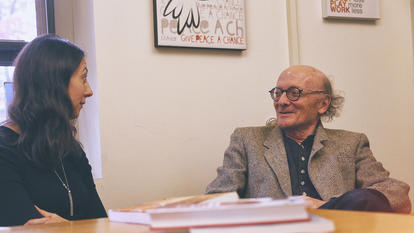
On International Day of Peace, Thoughts on Pacifism in 2020 from Professor Larry Rosenwald
September 21 marks the U.N.’s International Day of Peace, established in 1981. In 2001, just after the September 11 attacks on the U.S., the U.N. General Assembly designated the day as a “period of non-violence and cease-fire,” and encourages people to celebrate “by spreading compassion, kindness and hope in the face of the pandemic.” But how does one maintain hope in a year like 2020?
Larry A. Rosenwald, Anne Pierce Rogers Professor of American Literature, professor of English, co-director of the Peace and Justice Studies program, and a 2020 Guggenheim fellow who describes himself as a fundamental [fundamentalist] pacifist, shared his thoughts on the International Day of Peace and the philosophy of pacifism. Rosenwald, a Newhouse Fellow, will host a Newhouse at Home presentation called On Being a Pacifist Critic on September 23.
Is it difficult to be a pacifist today?
Larry Rosenwald: Yes, sometimes. I’m taking what is inevitably a minority position in a majoritarian society, in holding pacifist views and also in doing war tax resistance. (One of my students said to me, a while back, “Democracy doesn’t work so well for you, does it?”) And pacifists aren’t paid a lot of attention, on the whole, even in left-wing media.
On the other hand, it’s an uncontroversial but surprisingly little-known finding that the incidence of war worldwide has gone steadily and consistently down since the end of World War II; the finding is best set out in Joshua Goldstein’s book Winning the War on War, and there’s some discussion of it in the 2013 Human Security Report. So empirically, quantitatively, nations are making fewer and fewer wars on nations—this even when there’s war talk, about war against North Korea, about war against Iran. Too little attention is paid to the fact that the war talk, even during this term of a bellicose president, hasn’t led to war.
Do you find observances like the U.N. International Day of Peace to be effective?
Rosenwald: Tricky to say what “effective” means—there are all sorts of effects. A cease-fire of 24 hours is only 24 hours long. But norms change slowly. Michael Walzer, a noted non-pacifist and just war theorist, writes at the end of Just and Unjust Wars that “the restraint of war is the beginning of the peace.” Small steps, small steps, but that’s okay.
“At this extraordinary present moment, ideas once considered radical are widely supported, and pacifism seems a less marginal position, a more possible position.”
Larry Rosenwald
Regarding the 75th anniversaries of the atomic bomb drops at Hiroshima and Nagasaki at the end of World War II, what lessons do you wish U.S. citizens would keep in mind from those world-altering events as we get further away from them?
Rosenwald: It’s the job of a pacifist to be concrete, says the great pacifist Kathy Kelly, which means that I wish U.S. citizens would face what the bombings did to the inhabitants of those cities, most of them civilians. Even if the bombings led to the surrender of Japan (i.e., it’s also claimed that the surrender could have been obtained without the bombings, and then the inhabitants would have lived), and even if we think that justifies them, we should look at what else they did, whom they killed, whom they hurt.
Dreadful things were done in World War II, dreadful things were done in previous wars, but nothing that could destroy the world itself. Atomic weapons, which the United States and other countries still possess, but which only the United States has used in battle, can do just that. The American poet Naomi Replansky wrote a poem about that, called “Epitaph: 1945”: “My spoon was lifted when the bomb came down/ That left no face, no hand, no spoon to hold./ One hundred thousand died in my hometown. / This came to pass before my soup was cold.”
I’m a Jew; relatives of mine died in the Holocaust; I know that what defeated the Nazis was not pacifists but soldiers. It would be a dishonorable thing to deny that. But precisely on that account, it’s also wrong not to look the facts in the face.
How does one maintain hope in the face of ongoing wars and feelings of global and national injustice?
Rosenwald: Injustice is everywhere, and worsening. But war isn’t. And though I recognize the power of war metaphors—X is like a war, Y is like a war, we’re waging a war against terror, we’re waging a war against the virus, etc.—I’d also assert the importance of focusing closely on war in its literal sense. If one does that, then the fact that the Trump administration hasn’t started a new war seems significant. The norms governing war have shifted, I think, even among people who find war attractive, who are drawn to military hardware and parades and expertise; even among those people, going to war is becoming rarer.
And there’s another thing. At this extraordinary present moment, ideas once considered radical are widely supported, and pacifism seems a less marginal position, a more possible position. “Defund the police,” for example, is adjacent to the pacifist’s rallying cry, “defund the military.” Displacing, beheading the statues of Confederate generals makes the pacifist’s desire—to displace the statues of generals across the board—seem ordinary. And as noted, pacifists regularly challenge the use of war as metaphor: the war on drugs, the war on crime. But this summer, the use of war as metaphor to describe human attempts to maintain public health in the world of the novel coronavirus is being widely challenged, not only by pacifists but also by public health activists.
These synergies between pacifism and the radical activism of the present moment also give me hope.
What is one piece of pacifist writing you wish everyone would read?
Rosenwald: Only one? I’m torn. William James, “The Moral Equivalent of War”; Barbara Deming, Revolution and Equilibrium; Martin Luther King Jr., “Pilgrimage to Nonviolence”; and Terrence Malick’s 2019 film A Hidden Life, about the Austrian conscientious objector Franz Jägerstätter.



